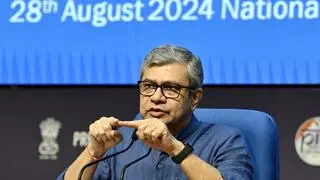The Cabinet on Wednesday cleared three railway projects worth nearly ₹6,500 crore. The three projects include setting up of two new lines and one multi-tracking project across Indian Railways. Projects are expected completion around 2028-29.
According to Ashwini Vaishnaw, Minister of Railways, IT and I&B, the projects cover seven districts in four States – Odisha, Jharkhand, Chhattisgarh and West Bengal – and will increase the national transporter’s network by nearly 300 route kilometres (RKMs).
The first project cleared included new line laying between Jamshedpur and Assansol connecting Purulia – an addition of 121 RKM – at an expected cost of ₹2,170 crore. The project connects Jharkhand and West Bengal. The new addition will strengthen a critical link in the railway network between West Bengal and Jharkhand improving connectivity on major trunk routes – Delhi-Howrah & Howrah – Mumbai.
“The project section will handle transport of coal and iron ore to steel plants at Burnpur and Durgapur, and also finished steel movement,” Vaishnaw said.
Second project
The second project would be improving connectivity – doubling of lines - between Sardega (in Sundargarh district) and Bhalumuda (Raigarh district), covering 37 km, at an expected cost of ₹1,360 crore. The project improves connectivity between Odisha and Chhattisgarh.
The third project Bargarh Road to Nawapara Road will cover 138 RKM and come up at an expected cost of ₹2,926 crore. According to the Minister, the project will cover “two important districts of Odisha” with Bargarh (being considered as the rice bowl of the state) and Nawapara (to be an aspirational district).
New line projects will provide connectivity to approx. 1,300 villages and about 11 lakh population. Multi-tracking project will enhance connectivity to approx. 1,300 villages and about 19 lakh population.
“The capacity augmentation works will result in additional freight traffic of magnitude 45 million tonnes per annum. Switch-over to Railways for logistics needs will lead to lower CO2 emissions – of 240 crore kg, which is equivalent to plantation of 9.7 crore trees,” Vaishnaw said.





Comments
Comments have to be in English, and in full sentences. They cannot be abusive or personal. Please abide by our community guidelines for posting your comments.
We have migrated to a new commenting platform. If you are already a registered user of TheHindu Businessline and logged in, you may continue to engage with our articles. If you do not have an account please register and login to post comments. Users can access their older comments by logging into their accounts on Vuukle.